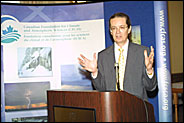Extreme weather
"Everyone complains about the weather but nobody does anything about it."
 Dean of Science Alan Shaver
Dean of Science Alan ShaverPHOTO: Owen Egan |
|
So Jacques Hurtubise, CEO of the Network for Computing and Mathematical Modelling, reminded us at the December 6 launch of several new research initiatives in extreme weather. The good news came on a freakishly balmy winter day.
Canadians are obsessed with weather -- with good cause. In the past few years, Canadians in different parts of the country have coped with a crippling ice storm, tornadoes and crop-threatening droughts. Around the world people are at the mercy of avalanches, floods and hurricanes. We may not be able to stop them, but better prediction could save lives and prevent damage.
McGill scientists will be involved in a new network of eight Montreal research centres brought together by the Network for Computing and Mathematical Modelling and the Meteorological Service of Canada.
Laboratoire universitaire sur le temps extreme (LUTE) will wrestle with computing and mathematical modelling. The network will coordinate and promote research in atmospheric sciences, and ensure quality personnel training.
In another initiative, the Canadian Foundation for Climate and Atmospheric Sciences is funding the Department of Atmospheric and Oceanic Studies to the tune of $3 million over three years, to be split between two projects.
Professor Peter Yau will lead a research team that will look for ways to improve predicting weather that's wet and wild -- rain, hail or snow.
Gordon McBean, chair of the board of trustees for CFCAS, says Yau's project "will lead to better computer models for predicting intense precipitation in a given area over a given period of time." He said Yau's research team "will also improve the representation of cloud and precipitation processes in weather prediction models and lead to better training for scientists and students."
Professor Isztar Zawadzki, director of the Marshall Radar Observatory, will head another team of scientists looking at ways to bolster the short-term forecasting of extreme weather, known as "nowcasting."
"The tools we use are not adequate for forecasting for 0-6 hours," explains Zawadzki. "There is a six hour spin-up time, which means it takes six hours for readings to get in.
"Nowcasting is more empirical. You take observations and apply algorithmic formulas, then you make the forecast. A basic forecast is one of persistence -- it will keep raining for six hours."
Zawadzki explains that a short-term forecast can be given in a minimum of minutes, crucial at an airport where aircraft take 10 minutes to take off. Will it start to snow in eight minutes or 20? Also, how much de-icing fluid a plane needs depends on how much time the aircraft is in snow.
Slightly longer-term forecasts "could be useful for sewer management in a city. How much water is going to be falling? This is very important ecologically." Also a city could better prepare itself for snow removal -- a topic dear to Montrealers' hearts and mobility.
Extreme weather demands vigilance. Although far from mid-west trailer parks, Montrealers might be surprised to learn that a couple of tornadoes hit the Montreal region each year. How serious are these? "Severe enough you want to be warned about it!" Zawadzki laughs.
The record-breaking ice storm was the result of a "constellation of low-probability factors," concerning temperature and precipitation. "All that coming together was a rare event."
But records will always be broken. "Combining these factors is like playing roulette. Always the low-probability event will happen with time passing," says Zawadzki.
To help better our understanding of such events, it was also announced that McGill is raising funds for an endowed chair in extreme weather. The Meteorological Service of Canada and the Institute for Catastrophic Loss Reduction have teamed up to provide half the funding necessary.

